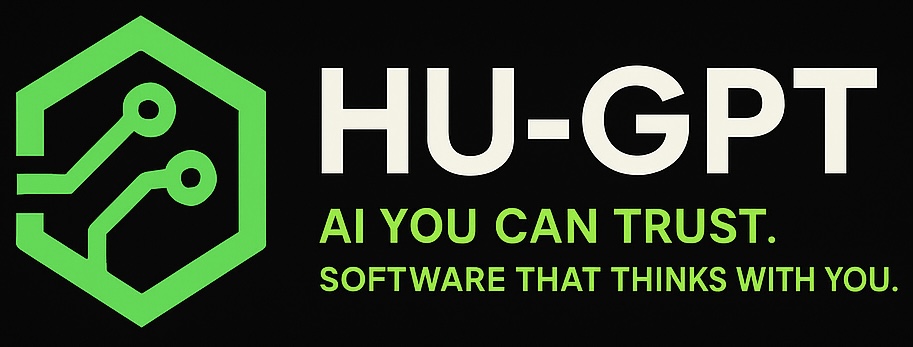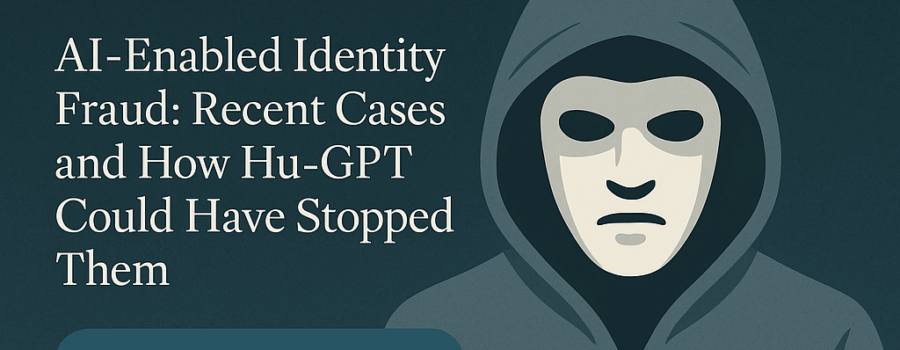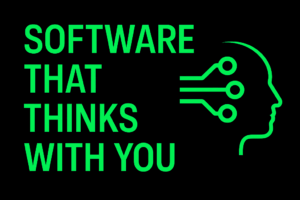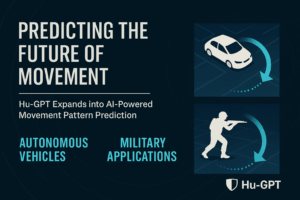FBI Warns of Deepfake Voices Impersonating U.S. Officials
In mid-May, the FBI issued a public alert about scammers using AI-generated voice deepfakes to impersonate senior U.S. government officials in phishing schemes . Since April, criminals have been sending “vishing” voicemails and fake texts claiming to be from high-ranking officials, hoping to build trust and then trick targets (often current or former government personnel) into revealing login credentials or transferring funds . This high-profile campaign shows how convincingly AI can clone a person’s voice to facilitate identity fraud.
How Hu-GPT Would Prevent It: The Hu-GPT Identity Authentication Suite could have instantly flagged the deepfake audio. During any live call or voicemail playback, Hu-GPT’s AI-driven verification (with its 99.9999999% accuracy against deepfakes) would detect the subtle signs of voice cloning. It would alert the recipient that the caller is not a real official, stopping the scam in its tracks before any trust or account access could be gained. On platforms like Zoom or Teams, Hu-GPT would likewise verify a speaker’s true identity in real time, making it virtually impossible for an imposter to pose as a government VIP without being caught.
Indonesian Politician Deepfakes Fuel Aid Scam
In Indonesia, police uncovered a scheme using deepfake videos of President Prabowo Subianto and other officials to defraud the public . Two suspects were charged in late April after creating fake video endorsements by the president and ministers, which they spread on social media to promote a phony government aid program . Unsuspecting victims were directed to a WhatsApp number and duped into paying “registration fees” for benefits that never existed. The syndicate’s deepfakes – including one circulated via an Instagram account with 9,400 followers – gave the scam a veneer of legitimacy, though police say only about 100 people (mostly in rural provinces) were swindled before the fraud was shut down . This case, while smaller-scale, highlights how AI-generated video can be used to mimic real leaders and manipulate public trust.
How Hu-GPT Would Prevent It: The Hu-GPT suite would make such political impersonations easy to spot. On any live video call or streamed address by an official, Hu-GPT’s identity checks would confirm whether it’s truly the person or a deepfake. In this scenario, if citizens or authorities had used Hu-GPT to verify the president’s supposed announcements, the software’s advanced video/audio analysis would have exposed the manipulated footage immediately. Even outside of live calls, platforms integrating Hu-GPT’s detection API could automatically flag and remove AI-faked videos of public figures. In short, Hu-GPT would have denied the scammers the illusion of authenticity, preventing people from ever trusting the fraudulent aid scheme.
Hong Kong Ring Used Deepfake ID Photos to Open Bank Accounts
A recent bust in Hong Kong revealed a criminal ring using AI to defeat banks’ ID verification. In a citywide crackdown announced April 19, police arrested eight people who merged their own facial features into stolen ID card photos – creating deepfake images – and then used those doctored IDs to open bank accounts online . By replacing the photo on a lost identity card with an AI-generated likeness, the scammers bypassed selfie checks and successfully opened at least 30 fraudulent accounts (out of 44 attempts) before getting caught . Hundreds of other suspects were arrested in the broader anti-fraud operation, which saw losses over HK$1.5 billion from various scams . The incident underscores how synthetic images can fool automated KYC (Know Your Customer) systems, enabling money launderers to create accounts under someone else’s identity.
How Hu-GPT Would Prevent It: Hu-GPT’s identity authentication tools would add an essential layer of defense in digital onboarding. If the banks had employed the Hu-GPT Suite in their verification process, each applicant’s photo and live selfie would be scrutinized by AI that can distinguish a real face from a GAN-generated or composite image with extreme precision. The suite would immediately detect anomalies or blending artifacts in the deepfaked ID photos, rejecting those applications before any account was opened. Moreover, Hu-GPT could prompt a live video verification call with the applicant and confirm, in real time, whether the person’s face matches the genuine ID holder. This would have stopped the fraudsters cold, preventing illicit accounts from slipping through the bank’s security checks.
Spain: Deepfake Celebrity Endorsements in $20M Crypto Scam
In Europe, authorities have dealt with a large-scale investment fraud ring supercharged by AI. In early April, Spanish National Police arrested six individuals behind a €19 million ($21M) cryptocurrency scam that ran fake ads featuring celebrity deepfakes . The perpetrators used AI tools to generate videos and images of famous figures (including well-known business and entertainment personalities) endorsing a bogus investment platform, which lured over 200 victims worldwide . Victims would see a convincing promo – for example, a renowned billionaire seemingly advocating a crypto opportunity – and were enticed to invest. The scam was sophisticated: after the initial con, the group even staged follow-up calls posing as “lawyers” or “Europol agents” to extract additional fees, all while maintaining the illusion created by the deepfakes . This high-profile case shows how AI-generated videos can lend false credibility to fraud campaigns on a global scale.
How Hu-GPT Would Prevent It: The Hu-GPT Identity Authentication Suite would have stripped away the scam’s false glamour. For one, any live webinar or video call with a purported VIP could be vetted by Hu-GPT – the software would confirm if the person on screen is genuine or an AI-generated impostor, making it impossible for scammers to use a deepfaked “celebrity” in real-time interactions. Even for prerecorded promo clips, organizations running ad platforms or social networks could use Hu-GPT’s detection engine to scan uploads and catch deepfake videos of public figures before they spread. In practice, if an investor had scheduled a live meeting with the supposed expert, Hu-GPT would have revealed the truth on the spot (no AI avatar could pass its verification). By leveraging this suite, financial regulators and media sites could also proactively block fake endorsements – effectively neutralizing the scam’s main persuasive weapon and protecting consumers from the very start.
AI Voice Cloning Hoax Targets Family in Texas
Not all deepfake-enabled frauds involve huge sums or famous targets – some are deeply personal. In one frightening case last month in Texas, a man received a phone call that mimicked his sister’s voice, crying and claiming she was in serious trouble . The caller (a scammer) used an AI voice clone so realistic that the man truly believed his sister had been hurt in an accident and was being held for ransom. He was moments away from sending money when he grew suspicious at the caller’s evasive answers; he hung up and confirmed his real sister was safe . Police later affirmed this was part of a wider surge in “kidnap scams” using AI-cloned voices of loved ones . While this hoax did not succeed, others have – such scams prey on a victim’s emotion and urgency, using technology to sound exactly like a family member in distress. It’s a stark example of AI-driven identity fraud on a smaller, more intimate scale.
How Hu-GPT Would Prevent It: Hu-GPT’s advanced voice authentication could turn the tables on this malicious trick. If the call had taken place over a platform enabled with the Hu-GPT audio verification, the software would have analyzed the incoming voice and detected the synthetic cloning immediately, despite the emotional manipulation. An alert or automated interruption could inform the recipient that “this voice does not match the real identity” of their sister, preventing panic. For instance, had the scammer tried a video call, Hu-GPT would have similarly verified the caller’s face and voice in real time – instantly exposing any AI-generated facade. Even for standard phone calls, a user with Hu-GPT’s app could get real-time warnings when a caller’s audio fingerprint doesn’t match who they claim to be. In short, the suite would provide peace of mind by instantly distinguishing real loved-ones from deepfake imposters, stopping fraudsters from exploiting our trust and fear.
Contact Hu-GPT today and prevent any kind of identity fraud.




